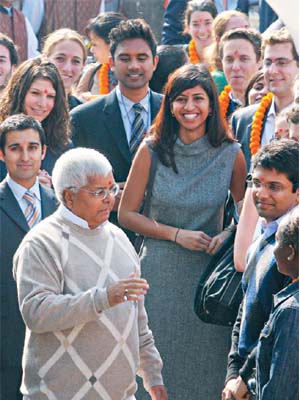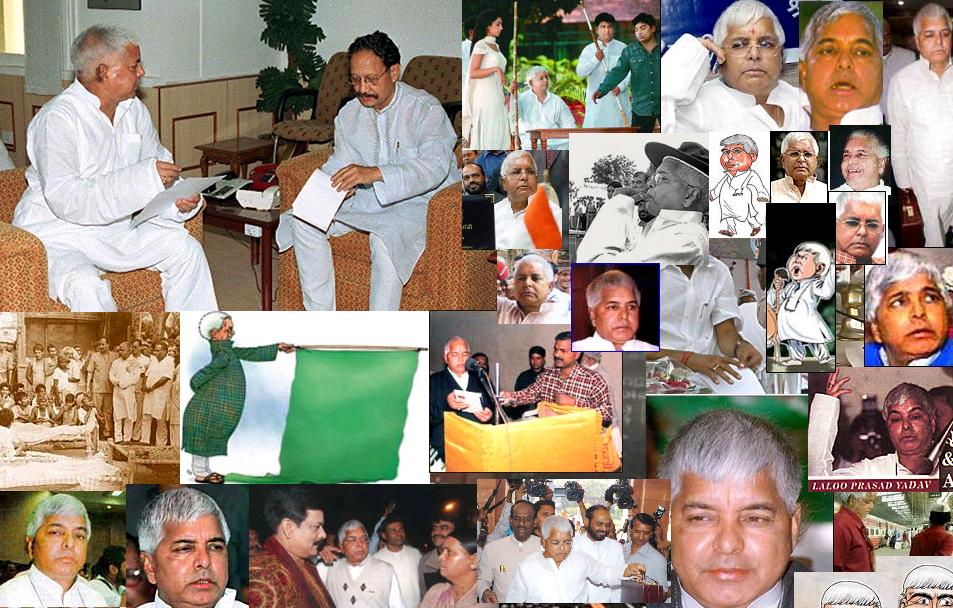




What are the possibilities?
There are 545 seats in the Lok Sabha. (Parliament of India - Wikipedia, the free encyclopedia) The chances of his party the Rashtriya Janata Dal getting half those seats on its own are nil. (Rashtriya Janata Dal - Wikipedia, the free encyclopedia)
List of political parties in India - Wikipedia, the free encyclopedia
Political Resources in the Net - India I (Parties and Organizations)
Indian Political Parties,Party Profiles,Political Parties in India ...
Political parties of India
India - Political Parties
List of political parties in India: Information from Answers.com
India Election 2004 - Manifestos of Indian Political Parties
The second best option would be the emergence of a Third Front. All the non-Congress, non-BJP parties would come together and go at it. That coalition would best be formed before an election. Maybe such a Third Front will gain a majority. If it does not, maybe that Third Front will still be larger than the Congress, and will get the Congress to support it by default.
A likely scenario would be where the Third Front is larger than the Congress, and a Third Front-Congress coalition takes over power. That is Laloo's best shot. He sure is qualified. He represents what is the Arkansas of India, Bihar. He represents the oppressed castes and Muslims. That is progressive. He has been an excellent Railway Minister. He has more than proven himself.
What comes to mind is a 1996 scenario when Jyoti Basu had the option to become Prime Minister but his party unwisely refused. Laloo will never refuge. Make him the offer he can not refuse.
Even today the seat distributions are as follows:
Congress 145
BJP 138
Rest 260
Should not 260 lead 145? But that asks for the creation of a Third Front, and within that Third Front, Laloo will have to build a coalition that makes it the largest group within that Third Front.
Indian Imponderables
In The News
Amitabh Bachchan, ‘The biggest film star in the world’ desiFans.com, India In 2002, he was voted as the most popular screen and stage icon of all time on a BBC online survey. ..... Singh, steel tycoon Lakshmi Mittal – who is of Indian origin – and Bollywood actors Abhishek Bachchan and Aishwarya Rai each followed with four percent votes each.
Lalu shares wisdom with Harward, Wharton pupils Hindustan Times
After IIM, Lalu makes an impact on Havard, Wharton
Graft charge for Indian minister 17 May 05 | South Asia
The lord of Bihar 30 Apr 04 | South Asia
Profile: Laloo Prasad Yadav 22 Mar 04 | South Asia
Bihar politician back in jail 21 Dec 01 | South Asia
Laloo Prasad sent to jail 26 Nov 01 | South Asia
Laloo Prasad taken into custody 05 Apr 00 | South Asia
UN envoy seeks Security Council action for Somalia CNN International
US Signals Backing for Ethiopian Incursion Into Somalia New York Times, United States
Islamists in Somalia Retreat From Ethiopia-Backed Forces New York Times, United States
Somali conflict is quickly deteriorating Los Angeles Times, CA
Ethiopian forces march to oust Islamist leadership in Somalia San Jose Mercury News, USA
Ethiopian, Somali Government Troops Score Major Advances Against ... Voice of America
Islamists flee Ethiopian onslaught in Somalia Telegraph.co.uk, United Kingdom
Ethiopia predicts victory against Islamists New Zealand Herald (Subscription), New Zealand
Israel moves to strengthen Abbas
Poll shows Clinton and Obama are neck-and-neck Capital News 9
Giuliani Leads Gore, Rodham Clinton for 2008 Angus Reid Global Monitor
And Now: Ford and Toyota? BusinessWeek
Ford Chief Seeks Ideas From Toyota
Recovering From Tragedy Washington Post, United States By Bill Clinton ..... more than 200,000 dead; 2 million people displaced; 370,000 homes destroyed or damaged; some 5,000 miles of coastline devastated; and 2,000 miles of roads ruined. ...... Nearly 150,000 homes have been rebuilt or repaired and 80,000 more are being reconstructed. ...... thus far translating some $13 billion in pledges into roughly $11 billion in firm commitments to critical projects. ....... the resilience of the human spirit ...... First, we must get better at managing risk. Climate change and patterns of human behavior ensure that more devastating natural disasters will occur in the future. ....... Second, we should pursue recovery practices that promote equity and help break patterns of underdevelopment. ...... Third, we must recognize that peace is critical to any recovery process. ..... Finally, we must do more to harness the talents of local entrepreneurs and established businesses, domestic and foreign, in relaunching economies. .... we need to do more to turn philanthropists into investors, and providers of access to new markets.
Olmert to meet Abbas in Jerusalem on Saturday Malaysia Star
UN Security Council sanctions Iran over nuclear program MarketWatch
Declare Nepal a Hindu state, demand religious leaders Hindustan Times
Maoists call off year-end strike in Nepal Times of India
Blogtalk: The Koran Debate New York Times
'Bomb could flood NY tunnels' News24
Driven out: Hevesi pleads to felony, resigns
US strike kills Afghan Taliban leader Houston Chronicle
Hillary Clinton embarks on media tour ABC Online
Toyota poised to become top car firm Toronto Star
China's cotton output unable to meet domestic demand
Spitzer Secretary of State Is Company Lobbyist
Tri-Band Test System supports worldwide WiMAX frequencies. ThomasNet Industrial News Room (press release)
Son performs last rites of living father Times of India
Spitzer Adds More People to Administration WNYC
Goode Has A Lot To Learn About Islam: Ellison All Headline News
Tunnel dangers in New York? USA Today
NY/NJ Subway Dangerously Vulnerable To Even A "Small Bomb"
Google Passes Yahoo in Tally of Visitors New York Times
Turkmenistan sets date for presidential elections Independent
Somali militia ready to fight Ethiopians Houston Chronicle
Dell wants its batteries back ZDNet.com.au
Soros sees India shining Daily News & Analysis
Beware of capital inflows, Soros tells India
Pakistan, India to survey disputed marshlands in January Monsters and Critics.com
Four Marines Charged With Murder In Haditha Killings MTV.com
Nigerian Militants Bomb Gov't Facility ABC News
U2's Bono receives honorary British knighthood
Bono Awarded Knighthood Voice of America
Rosie Beats Trump, By Numbers FOX News
NY Requires Health Insurance Coverage for Mental Health Patients eMaxHealth.com
